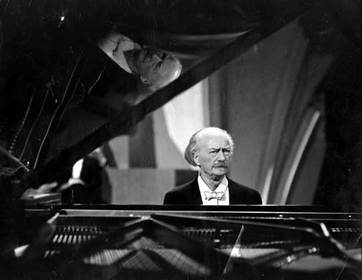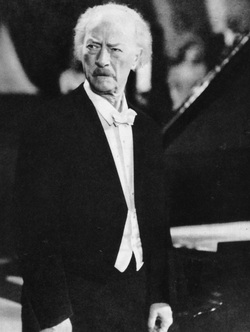
I was a teacher of history and theology for many years so I am always aware of what makes this or that date significant. As I thought about January 15, so many events come to mind. The easiest, of course, is the birthday of Martin Luther King, Jr.—a lifelong hero of mine. However, he is always in my thoughts and weighs heavily on my writings. So, I decided to go for something a little less well-known.
On January 15, 1922, Michael Collins became the first prime minister of the Free State of Ireland. In 1961, the Supremes signed to Motown Records. I could go on and on about either of those and so many other events. For me, however, one of the most interesting and touching stories comes from this date in 1919. So, let me set the scene.
Ignacy Jan Paderewski was a Polish pianist and composer born in the Russian Empire in 1860. His mother died only months after his birth and his father was arrested by Russian authorities in 1863. Young Ignacy was adopted by an aunt who provided piano lessons for him.
Eventually, he won a scholarship to the conservatory in Warsaw. He was a brilliant student and showed signs of brilliant performance and even composition.
He married in 1880 but his own dear wife died not long after the birth of their son. He devoted his life to music and continued studying with various masters. His talents made him wildly popular as a concert pianist. His fame grew so far and wide that one critic, upon hearing Paderewski perform, remarked, “He plays well, I suppose, but he is no Paderewski.”
His compositions were well-received and respected, from sonatas to an opera. He went to the United States to perform and see his own compositions performed by American musicians and opera companies.
While in America, however, World War I erupted all over Europe. He bought an estate in California and lived as an exile.
Far from remaining aloof from politics, he joined or founded several organizations dedicated to the relief and independence of Poland. He became an active member of the Polish National Committee in Paris which was soon accepted by the Allies as the representative of the movement to create the state of Poland.
On January 15, 1922, Michael Collins became the first prime minister of the Free State of Ireland. In 1961, the Supremes signed to Motown Records. I could go on and on about either of those and so many other events. For me, however, one of the most interesting and touching stories comes from this date in 1919. So, let me set the scene.
Ignacy Jan Paderewski was a Polish pianist and composer born in the Russian Empire in 1860. His mother died only months after his birth and his father was arrested by Russian authorities in 1863. Young Ignacy was adopted by an aunt who provided piano lessons for him.
Eventually, he won a scholarship to the conservatory in Warsaw. He was a brilliant student and showed signs of brilliant performance and even composition.
He married in 1880 but his own dear wife died not long after the birth of their son. He devoted his life to music and continued studying with various masters. His talents made him wildly popular as a concert pianist. His fame grew so far and wide that one critic, upon hearing Paderewski perform, remarked, “He plays well, I suppose, but he is no Paderewski.”
His compositions were well-received and respected, from sonatas to an opera. He went to the United States to perform and see his own compositions performed by American musicians and opera companies.
While in America, however, World War I erupted all over Europe. He bought an estate in California and lived as an exile.
Far from remaining aloof from politics, he joined or founded several organizations dedicated to the relief and independence of Poland. He became an active member of the Polish National Committee in Paris which was soon accepted by the Allies as the representative of the movement to create the state of Poland.

His music allowed him to move to and fro across borders and he became the chief ambassador for Polish independence in the middle of the European conflagration. He formed other social and political organizations, including the Polish Relief Fund of London.
In his travels to the U.S., he met with President Woodrow Wilson and played a key role in achieving the explicit inclusion of an independent Poland as point number thirteen in Wilson’s Fourteen Points, the peace terms that would guide him in the treaty conference following the cessation of hostilities in 1918 and would became the principles of the Treaty of Versailles which concluded World War I.
Before that treaty was adopted, however, the city of Poznan and the whole region of Wielkopolska (Greater Poland) remained in German hands and the fate of the region was still in the balance. Paderewski decided to visit the city of Poznan and gave a rousing speech to the inhabitants on December 27, 1918. An uprising ensued against the German occupiers and the German yoke was thrown off with Poland finally gaining the longed-for independence.
On January 15, 1919, Ignacy Jan Paderewski was appointed as Poland’s First Minister and Minister of Foreign Affairs. He played a key role in defining the 1919 Polish Constitution and he represented Poland at the Paris Peace Conference. It was Paderewski who was Poland’s signatory on the Treaty of Versailles which restored the territories of Wielkopolska and Pomerania around the city of Gdansk.
Later that year, on December 4, Paderewski resigned as Prime Minister and accepted the role of Polish Ambassador to the newly-formed League of Nations. Over the course of the next twenty years, he remained politically while maintaining his lively career in music.
Tragically, Hitler invaded Poland on September 1, 1939, igniting the Second War War. Paderewski—now aged 79—was in exile again as he traveled to London where he served as President of the Polish National Council, the government-in-exile. As part of that office, he set off for America to meet with yet another American wartime president, this time Franklin D. Roosevelt. His cause was the same, to campaign for Polish independence as part of any treaty.
While he was in the U.S., Paderewski died on June 29, 1941 at the age of 80. President Roosevelt authorized that Paderewski be buried in Arlington National Cemetery until such a time as his could be returned to a free and independent Poland.
That, however, would take some time as the Soviets placed Poland behind the Iron Curtain following the war. Poland had become a satellite state to the U.S.S.R.
In 1989, Poland had peacefully overthrown the Communist state of Poland. On June 29, 1992, Paderewski was returned to a free and independent Poland. It was 51 years to the day after his death. He received a state funeral at St. John’s Cathedral in Poland—the returning and too-long-absent hero.
He moved audiences with his music. He moved musicians with his compositions. He moved presidents with his will.
Never disregard the power of music and the will of a musician; they really do change the world.
In his travels to the U.S., he met with President Woodrow Wilson and played a key role in achieving the explicit inclusion of an independent Poland as point number thirteen in Wilson’s Fourteen Points, the peace terms that would guide him in the treaty conference following the cessation of hostilities in 1918 and would became the principles of the Treaty of Versailles which concluded World War I.
Before that treaty was adopted, however, the city of Poznan and the whole region of Wielkopolska (Greater Poland) remained in German hands and the fate of the region was still in the balance. Paderewski decided to visit the city of Poznan and gave a rousing speech to the inhabitants on December 27, 1918. An uprising ensued against the German occupiers and the German yoke was thrown off with Poland finally gaining the longed-for independence.
On January 15, 1919, Ignacy Jan Paderewski was appointed as Poland’s First Minister and Minister of Foreign Affairs. He played a key role in defining the 1919 Polish Constitution and he represented Poland at the Paris Peace Conference. It was Paderewski who was Poland’s signatory on the Treaty of Versailles which restored the territories of Wielkopolska and Pomerania around the city of Gdansk.
Later that year, on December 4, Paderewski resigned as Prime Minister and accepted the role of Polish Ambassador to the newly-formed League of Nations. Over the course of the next twenty years, he remained politically while maintaining his lively career in music.
Tragically, Hitler invaded Poland on September 1, 1939, igniting the Second War War. Paderewski—now aged 79—was in exile again as he traveled to London where he served as President of the Polish National Council, the government-in-exile. As part of that office, he set off for America to meet with yet another American wartime president, this time Franklin D. Roosevelt. His cause was the same, to campaign for Polish independence as part of any treaty.
While he was in the U.S., Paderewski died on June 29, 1941 at the age of 80. President Roosevelt authorized that Paderewski be buried in Arlington National Cemetery until such a time as his could be returned to a free and independent Poland.
That, however, would take some time as the Soviets placed Poland behind the Iron Curtain following the war. Poland had become a satellite state to the U.S.S.R.
In 1989, Poland had peacefully overthrown the Communist state of Poland. On June 29, 1992, Paderewski was returned to a free and independent Poland. It was 51 years to the day after his death. He received a state funeral at St. John’s Cathedral in Poland—the returning and too-long-absent hero.
He moved audiences with his music. He moved musicians with his compositions. He moved presidents with his will.
Never disregard the power of music and the will of a musician; they really do change the world.
 RSS Feed
RSS Feed
